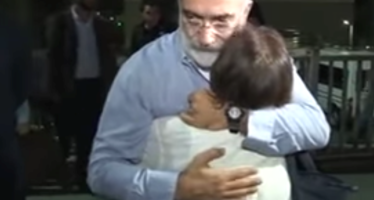“Without my identity card, it’s like I’m dead”
![]()

Felipe Fortines and other Dominicans of Haitian descent protest against new migration rules that could see them loose their nationality. © Reconoci.do
Elena Lorac was born and raised in the Dominican Republic, but the Dominican government considers her a foreigner. They want to send her to Haiti — a country she has never visited and where she doesn’t even have any relatives — just because her parents were born there.
When she tried to enrol in university in 2010, the authorities told the 25-year-old that the identity card she had held until then was not valid.
Decades ago, Elena’s Haitian parents moved to the Dominican Republic to work. At the time, the constitution automatically granted Dominican nationality to their children. But a recent change is stripping them of it – and all the rights that come with it.
Without a birth certificate and an identity card, Elena is not allowed to study, get a job, open a bank account or even receive medical treatment.
“This has ruined my life. I wanted to study but now I can’t do that, nor work. I can’t even buy a mobile phone. This has paralyzed my life completely,” she told Amnesty International.
“I would like to be able to study and help my family because they live in a very precarious (financial) situation, but without my identity card I cannot do anything. It’s like I’m dead.”
‘Stateless’
Hundreds of thousands of Dominicans of Haitian descent are believed to be in the same situation as Elena.
Last month, the Dominican Constitutional Court ordered the Central Electoral Board to search all birth registries since 1929 and remove anyone who was believed to have been wrongly registered and recognised as a Dominican citizen.
Between 1929 and 2010, the Dominican State granted nationality to all children born in the country except for those whose parents were diplomats or “in transit” at the time of their birth. “Transit” was considered anything less than 10 days.
Throughout the decades the Dominican Republic accepted a considerable amount of Haitian migrants, often employed as temporary workers in sugar plantations.
The state formally recognized their children as Dominican citizens, issuing them with birth certificates, identity cards and passports, irrespective of the migration status of their parents.
But things changed in 2004, when a new Migration Law provided a new definition of the category “foreigners in transit”, extending it to people with expired residency visas and undocumented migrant workers.
Authorities then started applying the law retroactively, arguing that Dominican-born children of Haitian parents who had already received Dominican nationality had, in fact, not been eligible for it at the time of their birth.
Deprived of Dominican nationality – and with access to Haitian nationality not automatic for second and third generation descendants of Haitian nationals – these people risk becoming stateless.
‘They want us to go to Haiti‘
Felipe Fortines, a 46-year-old Dominican lawyer of Haitian descent, can hardly believe his government might take his papers away.
“The birth certificate is the basis for all other documents. If you have any problems with that, you have problems with everything, particularly the identity card. And if you don’t have that you cannot access the health service or buy anything or study, so your life becomes null and void,” he told Amnesty International.
Haitians and Dominicans of Haitian descent have long suffered abuses and discrimination in the Dominican Republic.
Felipe believes that this sentence is partly based on that deep-rooted discrimination.
“I’m 46 and no one can understand how a court can ignore the fact that I’m Dominican. I have two children so this sentence would affect them, their children and their children. What they are saying is that a Dominican of Haitian origin will never be able to be Dominican.”
For many like Felipe and Elena, Haiti is a foreign nation. They have never been there, have no relatives there and don’t speak the language.
“According to the sentence, I would have to go to Haiti, ask them to grant me nationality and then come back to become naturalized. It’s absurd,” Felipe said.
Related Articles
For Ahmet Altan – in a Turkish prison
![]()
“Wounds are so deep and painful in these countries that in order to clean those wounds you have to use your pen like a scalpel”, Ahmet Altan
Former Argentine president found guilty of crimes against humanity
![]()
Jorge Videla was the de facto president of Argentina between 1976 and 1981 © APGraphicsBank Amnesty International has welcomed
La devolución de la base de Guantánamo: primeras consideraciones de la CELAC
![]()
En día pasados, varios medios de prensa han dado a conocer que la CELAC ha incluido el tema de la devolución de Guantánamo a Cuba en sus discusiones sobre la normalización de las relaciones entre Cuba y Estados Unidos




